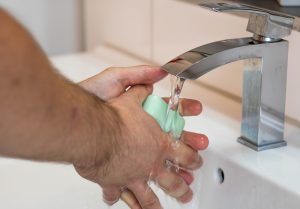
October 15-21, 2017 is Infection Prevention Week. As we work together to focus on your children's abdominal health it's important to be aware of how infection happens and key behaviors to instill to make sure you and your family are protected. Preventing disease is an important part of maintaining your child's good health. Throughout the day, your child is exposed to bacteria and viruses. This happens in various ways such as:
- playing with friends
- sharing toys
- using the toilet
- petting animals
Once your child has acquired germs on their hands, the germs can cause an infection through:
- eye rubbing
- placing fingers in the mouth
- picking the nose
The entire process of becoming infected can happen within seconds. For example, a single gram of human poop, which is about the weight of a paper clip, contains approximately one trillion germs. Germs can get onto hands if they touch any object that has germs on it because someone coughed or sneezed on it or was touched by some other contaminated object. When these germs get onto the hands, they can be passed from person to person and make people sick. Global research has shown that about 1.8 million children under the age of 5 die each year from diarrheal diseases and pneumonia.
Hand washing is the single most important act that you can teach your child for helping to prevent infection. Handwashing with soap could protect about 1 out of every 3 children who get sick with diarrhea and 1 out of 5 children with respiratory infections like pneumonia. Every child should learn how to wash their hands properly. Do not assume that your child knows how to wash their hands. Start teaching them at a very young age and set an example by washing your own hands. Good handwashing techniques are easy to learn and have been shown to significantly prevent the spread of diseases among children. Studies have indicated that handwashing education within communities:
- reduces the number of people who get sick with diarrhea by 31%
- reduces diarrheal illness in people with weakened immune systems by 58%
- reduces respiratory illnesses, such as colds, in the general population by 16-21%
When Should Your Child Wash Their Hands?
- Before eating meals and snacks
- After using the bathroom
- After playing outdoors
How Should Your Child Wash Their Hands?
- Wet the hands with clean, running water.
- Add bar or liquid soap and rub the hands together for at least 20 seconds making a soapy lather. Have your child hum the "Happy Birthday" song from beginning to end twice to time themselves.
- Wash the front and back of the hands, between the fingers, and under the nails.
- Rinse the hands under clean, running water.
- Dry the hands thoroughly with a clean towel and then turn the water off with the towel and dispose of it properly.
If soap and water are not available, then have your child use an alcohol-based hand sanitizer that contains at least 60 percent alcohol. Alcohol-based hand sanitizers can quickly reduce the number of germs on hands but sanitizers do
not eliminate all types of germs. If you would like more information about gastrointestinal (GI) digestive disorders, abdominal health or how to prevent infection in your children, please contact Dr. Mona Dave's Frisco Office or Request Appointment Here.


 October 15-21, 2017 is Infection Prevention Week. As we work together to focus on your children's abdominal health it's important to be aware of how infection happens and key behaviors to instill to make sure you and your family are protected. Preventing disease is an important part of maintaining your child's good health. Throughout the day, your child is exposed to bacteria and viruses. This happens in various ways such as:
October 15-21, 2017 is Infection Prevention Week. As we work together to focus on your children's abdominal health it's important to be aware of how infection happens and key behaviors to instill to make sure you and your family are protected. Preventing disease is an important part of maintaining your child's good health. Throughout the day, your child is exposed to bacteria and viruses. This happens in various ways such as: